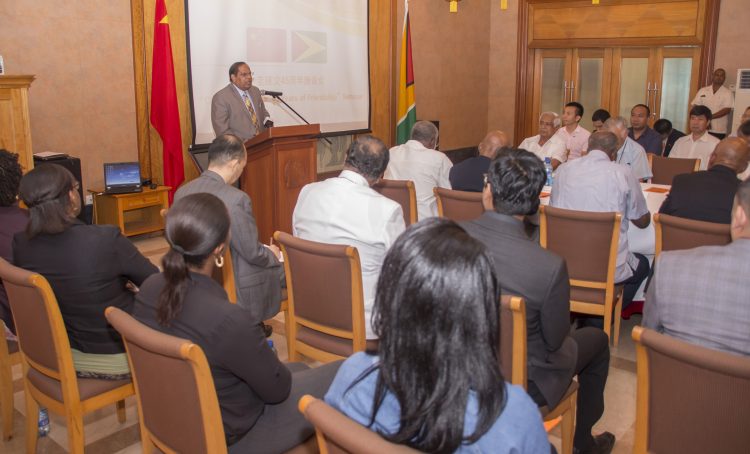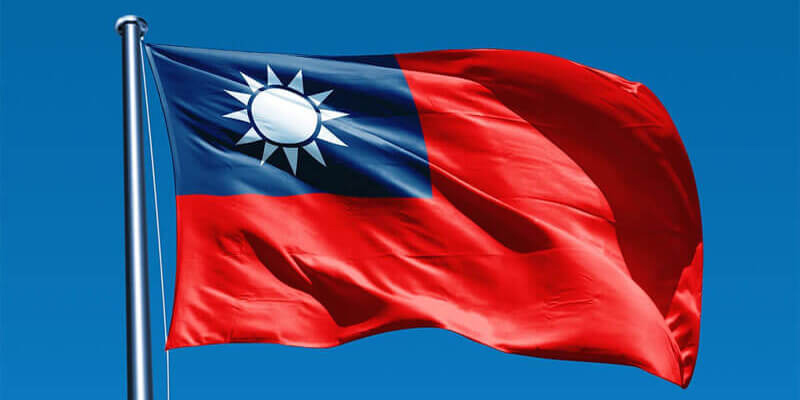Less than a day after it was disclosed by the US embassy here, the setting up of a Taiwanese trade office in Guyana was scrapped yesterday amid a blast from the Chinese Government, raising questions about decision-making at the Ministry of Foreign Affairs and whether Cabinet had been aware of the plan.
Engagement with Taiwan – considered by the Chinese to be a renegade province – has been a no-no for Georgetown over the last 48 years since its historic establishment of ties with Beijing and commitment to a `One China Policy’. Nearly five decades of carefully calibrated relations came under threat of unravelling on Wednesday when Washington hailed the establishment of the office and this was confirmed by the Minister of Foreign Affairs, Hugh Todd.
With Beijing apparently caught unawares by the move and seasoned foreign policy experts here in shock at the development, it appeared only a matter of time before pressure was brought on Georgetown to reverse the decision. The first sign of this came directly from Beijing. China’s Foreign Ministry demanded that those concerned “avoid setting up any official institutions with each other, and take practical measures to correct mistakes and eliminate negative impacts.”

Within hours the Guyana Government had backtracked. It issued the following terse statement.
“The Government of Guyana has noted various media releases on the matter of a Taiwan Office in Guyana.
“The Government of Guyana wishes to clarify that it continues to adhere to the One China policy and its diplomatic relations remain intact with the People’s Republic of China.
“The Government has not established any diplomatic ties or relations with Taiwan and as a result of the miscommunication of the agreement signed, this agreement has since been terminated”.
It did not explain from where the “miscommunication” had come.
Taiwan trade and investment offices are usually considered as de facto embassies for the island and this would have served as a flashpoint for relations with China. The Chinese Embassy here did not utter a word yesterday about the fiasco but last evening the Guyana Ministry of Foreign Affairs release a photo of Todd meeting with Chargé d’Affaires of the Embassy of the People’s Republic of China, Chen Xilai, during which they “discussed areas of mutual interest and cooperation”.
Last night Taipei accused China of bullying Guyana.
According to Reuters, Taiwan’s Foreign Ministry said that because of Chinese pressure Guyana had “unilaterally” decided to back out of the deal, and Taipei expressed deep regret it was unable to get the decision reversed.
“We express our strongest dissatisfaction and condemnation of the Chinese government once again bullying and compressing Taiwan’s international space and Taiwan’s participation in international affairs,” the ministry said.
China’s continued efforts to isolate Taiwan in the international arena runs counter to declarations by its leaders that it is against bullying and that “no one with thick arms and big fists has the final say”, it added.
“The Chinese government’s way of saying one thing and doing another will only highlight its evil nature and alienate people on both sides of the Taiwan Strait”, the ministry added.
Battering
The former governing APNU+AFC coalition lost no time in battering the PPP/C administration over the blunder.
“The APNU+AFC Coalition has taken note of reports that the PPP regime has withdrawn permission for the setting up of a Taiwanese trade office in Guyana.
“Less than 24 hours prior, news broke from the United States Embassy in Guyana that the PPP had granted permission for the setting up of the trade office, a de facto Tai-wanese embassy, and that such facility was already operational. This was confirmed by both Minister of Foreign Affairs Hugh Todd and Permanent Secretary of the Ministry of Foreign Affairs Elisabeth Harper.
“Now, less than 24 hours later, after the ineptitude, danger and recklessness of such a decision has been exposed, the bungling PPP regime has been forced to withdraw the permission. The damage however has been done. Decades old strong relations between Guyana and China have become strained in under 6 months of the PPP regime’s installation in office.
“The PPP has clearly, by its actions, departed from Guyana’s unwavering adherence to the One China Policy and demonstrated that it is willing to alienate and ostracize Guyana in the community of nations and from our longstanding friends and allies”, APNU+AFC said.
APNU+AFC said it will now take years and considerable diplomatic and other scarce resources to repair and rebuild trust with the Chinese after this “gigantic diplomatic blunder by the inept PPP regime”.
“The APNU+AFC Coalition reaffirms its commitment to the One China Policy and the strong, decades-old relations with the people and government of China. On behalf of the right-thinking people of Guyana, the APNU+AFC Coalition expresses regret to the People’s Republic of China for this irrational and impetuous act by the PPP regime”.
Prior to the rescinding of the deal, Leader of the Opposition, Joseph Harmon yesterday also expressed concern.
“We find that very absurd. It goes against what we have always known to be [Guyana’s] foreign policy which is based on our own interest and not the interest of any other state,” Harmon said.
According to the former Minister of State Guyana has always espoused the one China policy.
“We have strong diplomatic relations with the People’s Republic of China and that relationship has stood the test of time. Any sudden change like this in our foreign policy posture will require some deeper level of questioning before it is sprung on the people like that,” he stressed.
The egregiousness of the policy change is compounded Harmon noted by the fact that it was not announced by the Guyanese government but by the government of a foreign state, the United States of America.
On Wednesday evening the US announced the decision through a statement posted by its embassy here and which was shared by Deputy Secretary of State Julie Chung on her Twitter page.
“The United States applauds the agreement to establish a Taiwan Office in Guyana. Deepening ties between Guyana and Taiwan will advance their shared goals of prosperity and security. Closer ties with Taiwan will advance cooperation and development in Guyana on the basis of shared democratic values, transparency, and mutual respect,” the statement said.
Minster of Foreign Affairs Hugh Todd had told Stabroek News on Wednesday night that this new measure does not affect the state’s commitment to the one China policy.
Todd had said that compartmentalization was key and there would be no bilateral diplomatic relations between Guyana and Taiwan as the ‘One China Policy’ has not been broken.
“More than half the countries in the world have investment relations with Taiwan and we are just the newest addition to that lot. China has a good relationship with Latin America and the Caribbean so I don’t see it [the decision] affecting anyone,” Todd told Stabroek News when contacted.
“I don’t see it as a conflict. We don’t have diplomatic relations with Taiwan. What we have are investments. There will be no interstate relations, “he added as he explained that it will be private sector relations and not business done with government.
Todd was asked why such an important announcement was first made public by the United States and not this country’s Foreign Ministry. He explained that the agreement for the establishment of the Taiwanese investment office here was made “only yesterday” and was simultaneous with works being taken to have the two vessels and twelve crewmen seized by Venezuela in this country’s waters, released soonest.
“We don’t control the US’ actions. We will put out a statement when the time is right. This thing only happened yesterday and you know we were working around the clock to have the two vessels with the crews return home. That [the return of the crews] was the priority,” he explained.
He said that the public should not be worried as “a statement will be issued soon”.
Repercussions
But career diplomats on Wednesday night posited that the government seemed not to have fully grasped the magnitude of the decision and the repercussions it could have on relations between Georgetown and Beijing.
“Can they sell that reasoning to China? I think not. How do you stop the Taiwanese, when a foot is in the door here from not upping the pressure to be recognised. This is just a foot in because they will use the very investments to have their diplomatic positions heard. Diplomacy is different and you have to understand it because what we may think is a small decision and insignificant can be seen as shunning by another party,” one veteran diplomat told this newspaper.
“We were the first in the English-speaking Caribbean to recognize ‘One China’ on June 26th 1972. The Chinese have always commended us for not isolating them from this part of the hemisphere. Suddenly, the government decides to throw Taiwan into the mix. I do not think the Chinese will be happy,” another diplomat posited.
Diplomatic watchers say the swift announcement of the office by the United States underlines Washington’s stepped up role to roll back Chinese influence in this part of the world. Since entering office the PPP/C government has taken a decidedly pro-US line which has seen it agree to support Washington’s candidate for the Presidency of the Inter-American Development (IDB), another move seen as aimed at limiting China’s reach into the region.
Georgetown was favoured by the first ever visit of a US Secretary of State when Mike Pompeo visited in September last year. It has also seen a flurry of high-level diplomatic, military and investment interest from Washington. It dusted off a shiprider agreement with Washing-ton and last month hosted the Head of the US Southern Command, Admiral Craig Faller.
In October last year, it hosted the Head of America’s development bank, Adam Boehler on an investment mission.
Diplomatic observers say Taiwan – also known as the Republic of China – doesn’t invest in countries unless there is a modicum of diplomatic recognition. For years Taiwan has flirted with gaining a toehold in Guyana but PNC governments in particular had frowned on this given the established `One China Policy’.
The decision to set up the office was all the more puzzling given the longstanding relations between the PPP and the ruling Chinese Communist party. Political observers have however contended that over the years the PPP no longer exhibits any particular ideological bent.








